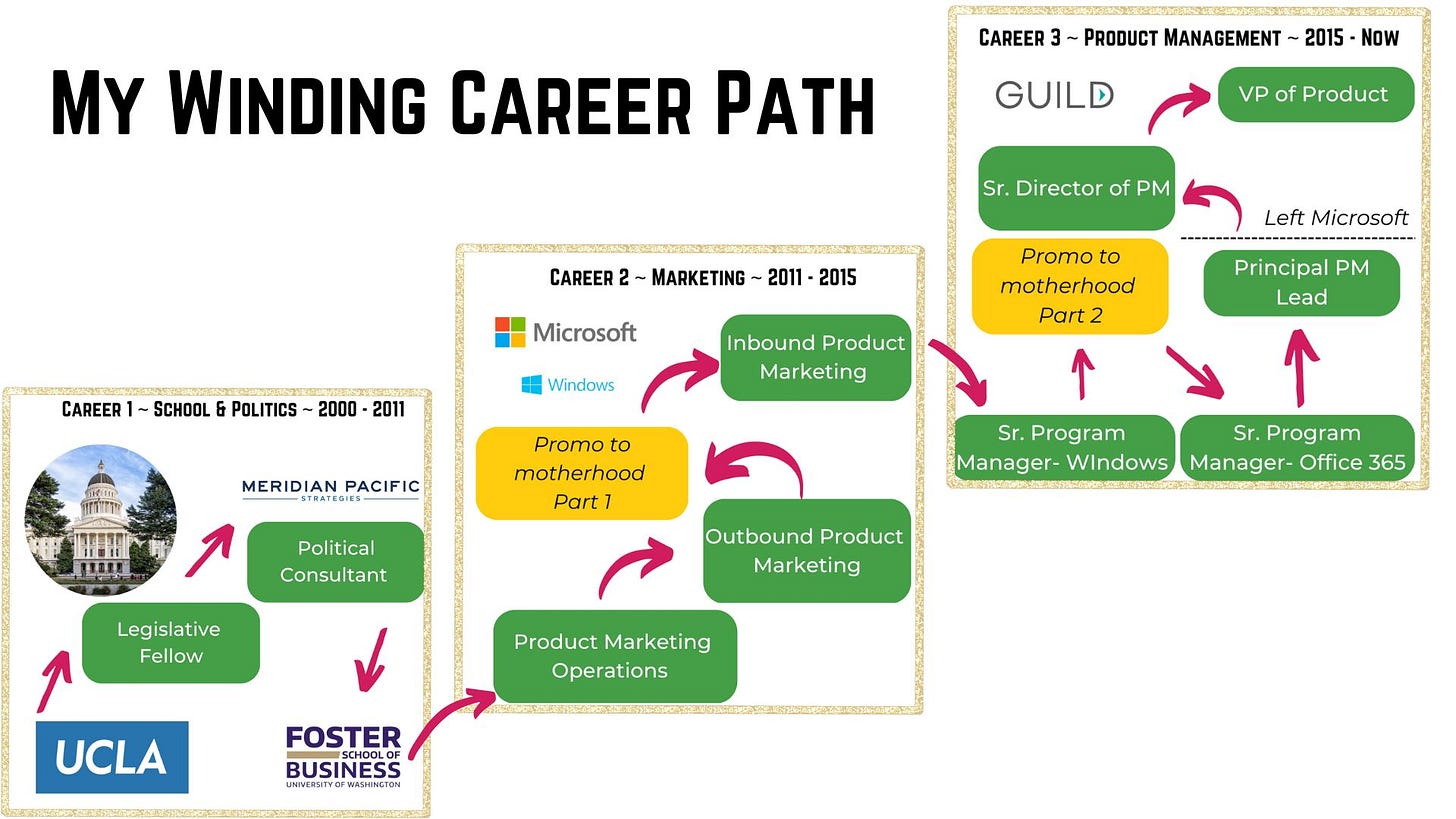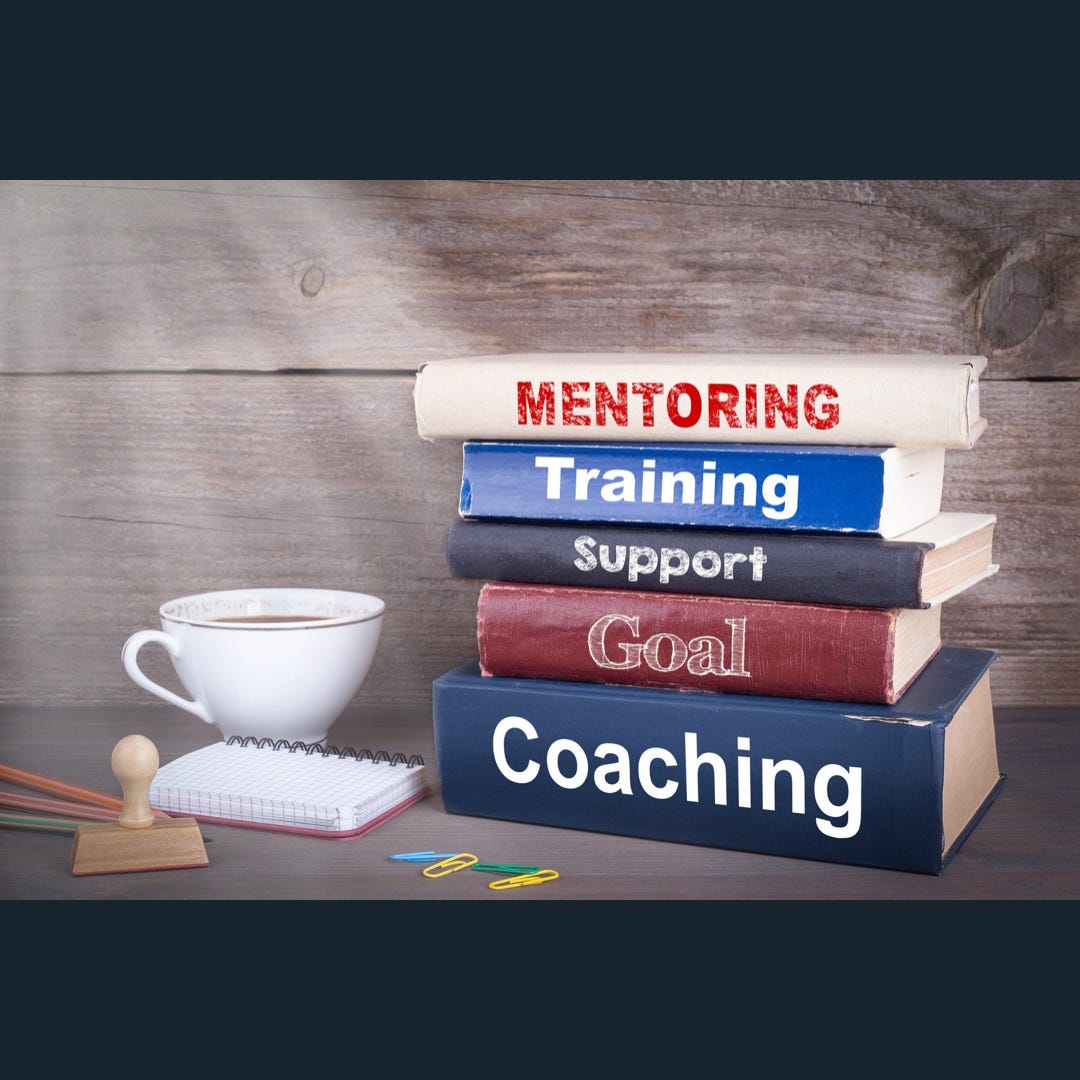🌶️ Helen's Professional Path - 18 Years and Counting
Keeping working exciting from graduation to almost 20 years later
👋🏻 Helen here with our weekly newsletter. I have just celebrated my two-year anniversary at Guild as well as a promotion to Vice President of Product. This moment has given me a chance to reflect on what I have learned along the way.
My path included going to school (twice), having kids (twice), moving professional disciplines (three times) and changing companies:
“Well, if you can get in, I have hope too,” said a classmate in high school to me upon learning of my acceptance to UCLA. I wasn’t an A student in high school, nor did I get top standardized test results (having not grown up in this country, learning how to take tests or spending lots of money on college prep courses was not something I or my family knew was needed). However, I was the editor-in-chief of the school yearbook and involved in a variety of other clubs, persevered learning English as a second language quickly, and figured out how to not miss the college boat despite being a first-generation immigrant.
Just as my path to UCLA was not exactly linear (my mom was surprised when I chose yearbook as an elective over Spanish), my path in my career has also had its number of twists and turns. Between career switching, stopping for extra schooling as well as pausing to have kids, my journey has been a mix of lateral and forward moves since graduating from college almost 19 years ago.
And despite or because of it, last week I celebrated 2 years at Guild and a big career milestone of being promoted to Vice President of Product. This week, I look back, analyze and honor how I have found success, fulfillment, and avoided boredom.
Increase your option value - understand your professional space
Early on at Microsoft, I spent 4+ years in marketing - always in Windows, but I moved teams and projects almost every year so I was able to learn the scope and span of marketing - I started in marketing operations, then worked in sales enablement and finally learned inbound marketing and product positioning. At the end of my marketing journey, I had enough knowledge of the discipline that I could have picked to go deep across a variety of marketing roles at a large company or play a bigger role at a start-up or a mid-size company.
In marketing, I became known as a utility player (I once hopped on a plane on 24-hour notice to deliver Windows devices for a launch event in Paris) and I actively built relationships with a variety of managers. As a result, I was able to traverse the organization and learn different aspects of marketing as I was figuring out if this career was right for me.
When I later moved to Product Management, I did a similar exercise - trying out a more technical role where I was working on features that were core to the infrastructure of the Windows operating system vs. a more front-end, scenario, and experience-based PM role in Office 365. This experience helped me see that while I could do both, I did prefer the latter.
It also prevented me from getting bored, which was something I learned I needed to solve for in my professional career.
Know your worth - no one can see you if you don’t see yourself
After 4 years in marketing, I was debating whether or not I should stay in that discipline, move to product management or try out sales. As I settled on wanting to try the world of product management, I was cautioned that I may have to take a “demotion” in my level since expectations of a Sr. Product Manager are such that I may not be set up for success if I come in without experience. Because I was running to a new opportunity and not running away from an unhappy situation, I was able to continue evaluating my options until I found the right job and a manager who saw (and needed) the value I was bringing to the team. The trade-off was that I went to a team whose work did not get a lot of visibility in the organization - licensing tech for Windows. I knew though that my background uniquely positioned me to contribute from the start as a Sr. Product Manager, while I learned the ins and outs of becoming a Product Manager.
This transition brought forward so much self-doubt and subsequent reflection. To understand what I bring to the table (as I was meeting with teams internally who questioned my seniority), I interviewed externally, re-connected with my MBA network and met with my mentors and sponsors to help me flesh out my stories and see my worth from a different and more complete perspective. In these moments of change, I learned that I needed to quiet my self-critic.
I have learned that if I don’t see my worth, it will be difficult for others to see it as well.
Think about your career in decades not months or years - promotion velocity will speed up and slow down throughout your career
I remember going on maternity leave with my second child just as talent calibrations and reviews were going to happen. I lamented that I will be out of sight and out of mind, worried that my impending promotion and perceived impact will be less because I wasn’t going to be present during a critical time period. In my experience, recency bias is real more often than not (and now as a leader, I work hard to fight that as well) and I needed to come to terms with the fact that there was nothing I could do about this.
A wise person suggested that I zoom out and think about my career spanning decades vs. a couple of years. So I pivoted and started looking at my professional life with a zoomed-out lens which gave me the perspective that if I don’t get a promotion in the upcoming review cycle, it is not a lifelong setback, but a moment in time.
Alternatively, the cost of not having kids when Adam and I decided we were ready would be much higher on my lifelong happiness and fulfillment. I was grateful to be promoted to motherhood both times. And yes it absolutely took a short term toll on my promotion velocity, and it felt unjust. However, as time passed, I did see it as a blip and a learning moment.
Lean on sponsors
There is a big difference between mentors and sponsors and there is data to show that women are over-mentored and under-sponsored so I have been intentional about having both mentors and sponsors in my professional career.
I am so grateful for the managers and mentors in my life who have evolved over time to become sponsors. I could not have successfully transitioned to Product Management as a disciple without people who understood my worth and bravely took a chance on me.
When I decided that it was time to look for the next opportunity as a PM lead, I was determined to go to a team where I had a sponsor because I wanted to be able to hit the ground running and have an impact faster.
As I transitioned to a growth company, I ended up taking a job working for a past manager, which sped up my onboarding and finding my voice since I came into a role sharing a common language and pre-existing trust with my boss.
Always be learning
Every job I’ve had, I’ve been grateful for - and all jobs have had their share of grunt work and glamour. From distributing 10,000-yard signs on a 2 day notice for a presidential campaign to standing up a worldwide device loan program at Microsoft, to organizing and running a global brand photoshoot to figuring out how to run the largest cross-functional project at a mid-size company that has never done this before - I had great learnings throughout these adventures. And additionally, I also try to seek out a periodic industry learning opportunity (at least annually is my goal).
The key for me is to figure out what I am learning in every assignment (Adam wrote an article on how to shift into the learning mindset, that I have found to be helpful) by stopping long enough to reflect on what went well, what I’ll do better next time and most importantly, what is a transferable skill that I learned.
Practically, I think about how will I talk about a challenge I overcame and what I learned from it in an interview.
As an interviewer, a question I often ask is what skills and learnings are you hoping to develop in this job and why. Understanding that about a candidate, helps me assess if the job I am hiring for will meet their growth needs. As a leader, I not only try to be intentional in what I am getting out of an opportunity, but also think about people who work for me and if they are learning and growing in their careers.
Many say that a job is a job, and we work in pursuit of financial stability and safety, but I have found much more joy and satisfaction when in addition to my basic needs being met, I am also finding long-term value in the learnings on the job.
Summing it up
One of the reasons I love Mind the Beet is it gives me an opportunity to “live out loud” and share my reflections and learnings as I move through many facets of my life. As always and especially in these moments of reflection, I am grateful for the support that I have received over the years from my family, colleagues, managers, and friends. And thank you to you, Mind the Beet readers, for being part of this journey. Onwards!



